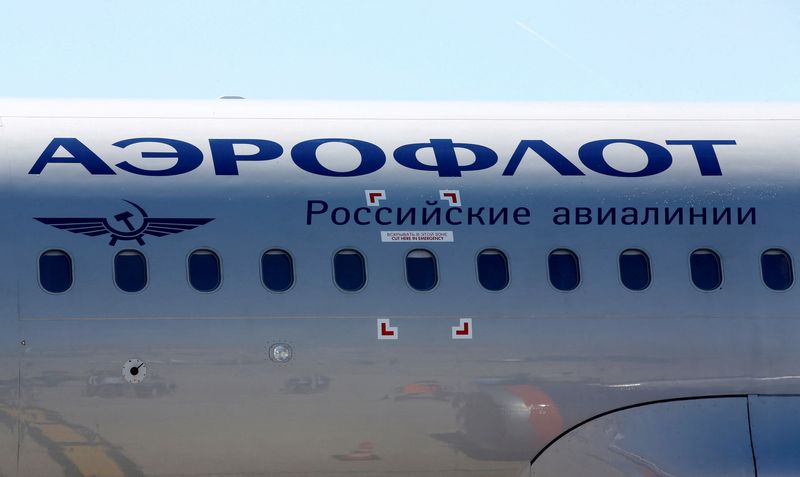By Gleb Stolyarov
(Reuters) -Russia has handed out more than $12 billion in state subsidies and loans to keep its aviation sector afloat since Western sanctions over Moscow's invasion of Ukraine cut off supplies of key parts and maintenance services, a Reuters analysis shows.
Dependent on foreign-made aircraft, Russia faces the daunting task of developing its aviation industry alone with domestically sourced parts, while buying aircraft from foreign lessors to avoid more of its fleet being seized.
Western planemakers Airbus and Boeing (NYSE:BA) halted supplies of services and spare parts in March 2022 and dropped regular maintenance support for flag carrier Aeroflot and other Russian airlines.
Since then, Russia has spent 1.09 trillion roubles ($12.07 billion) supporting the civil aviation industry, including aircraft manufacturing and financial assistance for airlines, Reuters calculations show, based on data from the Ministry of Finance and the Accounts Chamber, which oversees budget execution.
The spending is almost twice as much as 547 billion roubles in payments made in 2020-21, when the COVID-19 pandemic caused a drastic reduction in air travel, and highlights the scale of the Kremlin's effort to wrest control of a crucial industry.
"Our fleet of aircraft is very overloaded ... with foreign-made planes," President Vladimir Putin said last week. "We plan to produce more than 1,000 aircraft by 2030, our own planes. Work is needed."
According to Swiss aviation intelligence provider ch-aviation, Russian airlines currently operate 991 aircraft, including 405 made in Russia.
But just 133 are Superjets made by state-owned producer United Aircraft Corporation. Other Russian-produced aircraft - Tupolev, Yakovlev and Ilyushin - are rarely used for commercial flights.
Support for aircraft manufacturing, a key industry, will be maintained for years to come, the industry and trade ministry said in response to Reuters' findings.
"The main emphasis is on supporting sales, expanding production capacity and creating a post-sales service system," the ministry said.
The importance of a reliable air industry is particularly crucial for Russia, both for transporting people and goods across its enormous territory and to bolster Moscow's narrative that sanctions have had but a minimal impact.
With voters heading to the polls in three months, the collapse of an airline could apply reputational and electoral pressure on Putin who is running again for president.
As a key aviation power since Soviet times, Russia's technical ability is not in doubt.
Western aviation analysts say the investments will at best keep the fleet flying but doubt its aircraft will return to Western markets any time soon, even if the conflict in Ukraine ends. That's because of the cost and bureaucracy involved in rebuilding a fleet with a clean and traceable safety record and approved parts.
RAINY DAY FUNDS
Russia has dipped into reserve funds, the data showed, spending 110 billion roubles in 2022 on compensating airlines for losses from a sharp rise in jet fuel costs.
This year, the National Wealth Fund (NWF) has played a bigger funding role with Moscow drawing almost 400 billion roubles for aviation spending so far in 2023.
The scale of spending in 2022-23 is equivalent to just under 1% of projected gross domestic product (GDP) for 2023. Russia has spent an additional 2.3 trillion roubles in 2022-23 on developing transport outside the aviation sector.
The country's domestic air passenger traffic began to rebound in late 2022, as airlines found ways to import spare parts through a grey import scheme the government introduced.
Russian airlines have kept their fleet of Western jets in the air, partly by importing spare parts via third countries without the manufacturers' - mainly Airbus and Boeing - consent.
Passenger numbers are recovering but still lag pre-COVID levels. Meanwhile, the loss of foreign parts and maintenance expertise has raised concerns about aircraft safety.
Some airlines have stripped airplanes for parts, aviation industry sources told Reuters last year.
Moscow hurriedly localised the registration of its fleet and has used NWF funds to buy back aircraft from foreign lessors to avoid the risk of their confiscation when flying abroad.
Transport Minister Vitaly Savelyev said 300 billion roubles could be used for buying aircraft from foreign lessors in 2023.
So far, 190 billion roubles has been spent, the data showed, with state-owned insurance company NSK holding aircraft on airlines' behalf.
A government document setting out strategic spending plans for aviation, seen by Reuters last autumn, said that Russia would have to spend at least 711 billion roubles on "achieving technological independence from foreign suppliers".
Aeroflot, the transport and finance ministries did not respond to requests for comment.
($1 = 90.2900 roubles)
